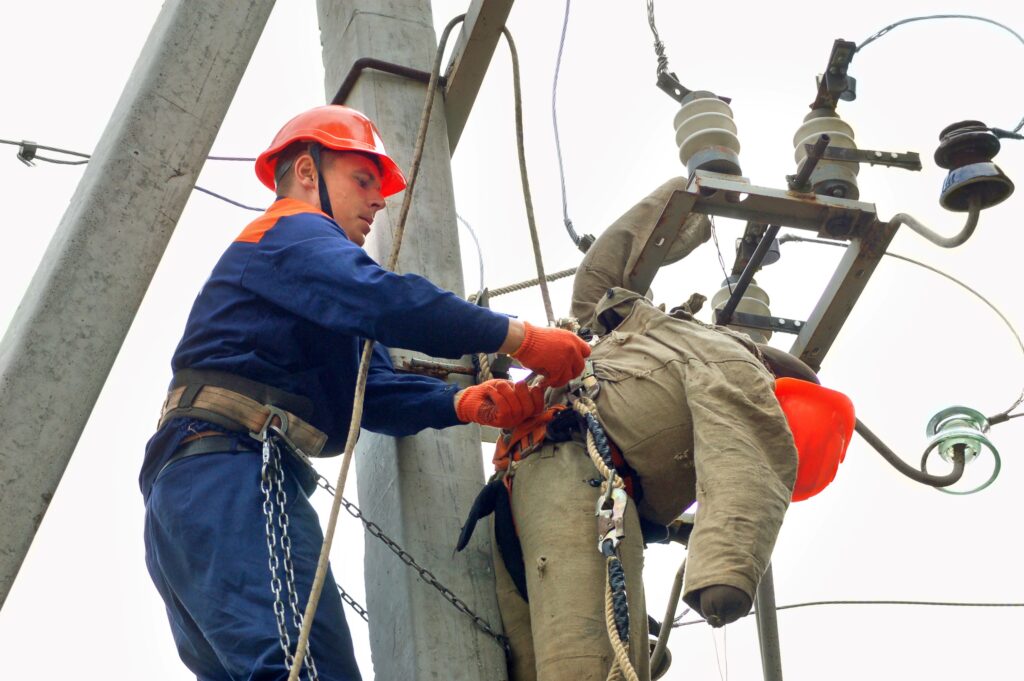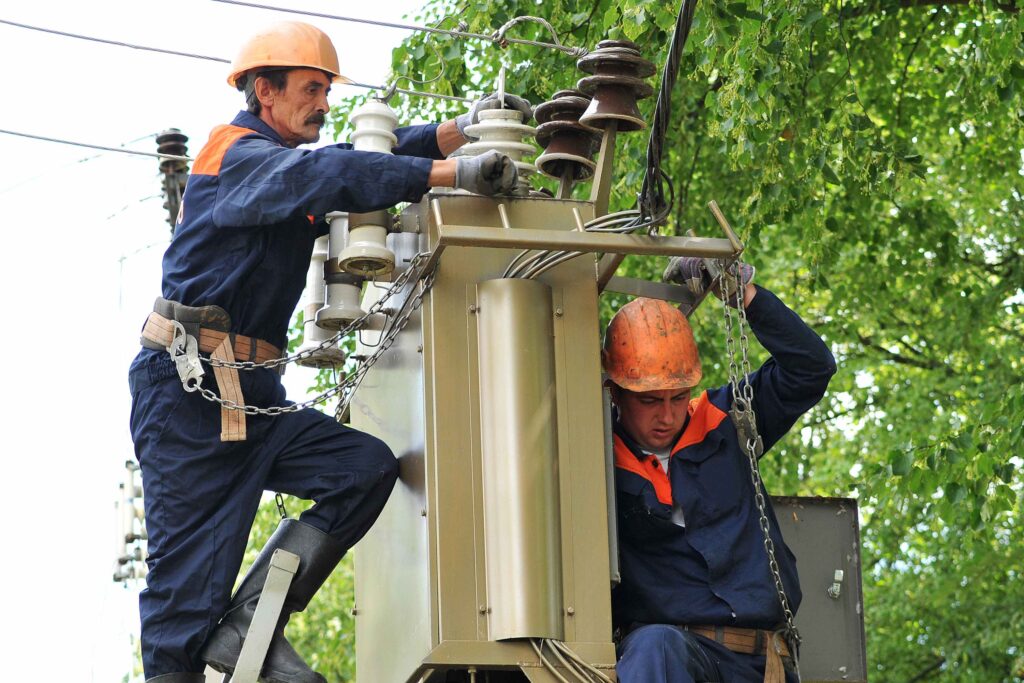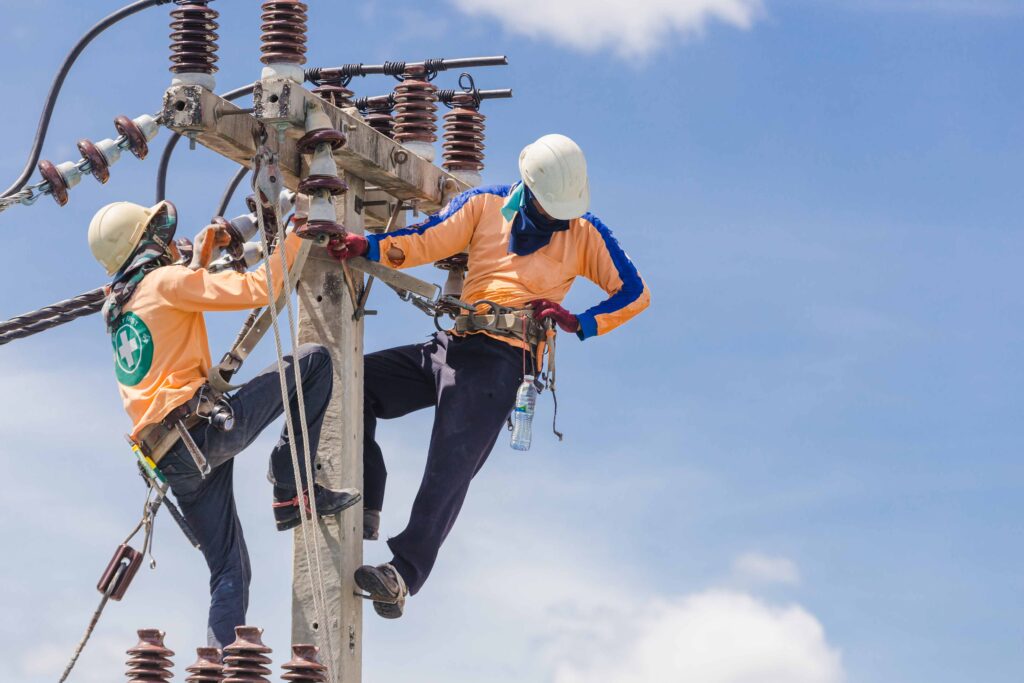A Lineman Apprenticeship provides hands-on training for those seeking careers in electrical line work. It combines classroom instruction with field experience under expert guidance.
Embarking on a lineman apprenticeship marks the start of a journey into the electrical trade, where apprentices learn to install, maintain, and repair high-power transmission and distribution lines. This training is imperative for safety and skill development in a field that demands precision and reliability.
Aspiring linemen gain knowledge in using tools, understanding electrical systems, and adhering to safety protocols, while also earning hours towards certification. This blend of technical learning and practical application equips apprentices with the robust skill set required to excel in the electricity sector. Acareer as a lineman offers stability and growth, making this apprenticeship a pivotal entry point for those passionate about powering communities and working with their hands.
What Is A Lineman Apprenticeship?
Electricity powers homes, schools, and businesses. It travels through cables. These cables need care from skilled workers. These workers are called linemen. They fix and set up power lines. People learn this job through lineman apprenticeships. Ready to find out what this is? Let’s explore.
Definition And Overview
A lineman apprenticeship is a training program. Aspiring linemen join it. They learn by doing. They also study. Experts teach them. Safety is key. They figure out how to work with electricity safely. Work happens outside, in many places. Apprentices get strong and smart. After they finish, they can be full linemen.
Key Requirements
- Age: Must be at least 18 years old.
- Education: Need a high school diploma or GED.
- Physical Fitness: Linemen climb and lift. Good shape is a must.
- Driver’s License: Must drive to job sites.
Testing starts the journey. A written test and an interview come first. Health checks follow. Drug screening is part of this. Training spans years. Safety gear and hand tools are basic needs. Apprentices learn to put up poles and wires. They work with pros. After some time, they take a final test. Passing it means they become journeyman linemen.
Benefits Of A Lineman Apprenticeship
Embarking on a Lineman Apprenticeship unlocks a world of opportunities. This career path mixes structured learning with hands-on experience. It offers several compelling benefits, from practical skills to job security. Explore the advantages and forge a powerful career.
Hands-on Training
Real-world experience is key in the utility sector. Lineman apprenticeships provide this in spades. Trainees handle actual equipment and tackle live projects. This hands-on approach builds proficiency and confidence. Apprentices learn by doing, the best way to master the craft.

Industry Certification
Completing an apprenticeship leads to recognized credentials. Certification validates skills and knowledge. It acts as a benchmark for quality and safety in the field. Apprentices emerge as certified professionals, a critical step for career progression.
Job Security
The demand for skilled linemen is consistent. Infrastructure growth and maintenance assure steady work. An apprenticeship offers a path to a stable career. Skilled workers can count on employment even during tough economic times.
Step-by-step Guide To Become A Lineman Apprentice
Are you interested in a career that keeps the power on and the lights bright? Becoming a lineman apprentice is a thrilling path that leads to a rewarding career in the electrical industry. This guide breaks down the steps to join this high-demand field.
Research Apprenticeship Programs
Research Apprenticeship Programs
Start with a solid foundation. Discover the programs available in your area. Look for ones that match your career goals and are recognized by the industry. Programs can vary, so it’s essential to choose the right one.
- Check local trade schools and community colleges
- Explore online resources for program listings
- Talk to current linemen for program recommendations
Meet Eligibility Criteria
Meet Eligibility Criteria
Ensure you meet all the requirements. Every program has its own set of criteria. Common requirements include:
- A high school diploma or GED
- A driver’s license
- Basic physical fitness
- Ability to travel
Some programs may ask for additional qualifications. Always double-check what’s needed.
Apply for Apprenticeship
Apply For Apprenticeship
Once you find the right program and meet eligibility, it’s time to apply. Gather all your documents. Prepare to highlight your strengths. Typical application steps include:
- Submitting an application form
- Attending an interview
- Passing an aptitude test
Keep deadlines in mind and follow up on your application status.
Complete Required Training
Complete Required Training
Getting accepted is a big step. Now focus on the training. You’ll learn the ropes from experienced professionals. Training usually involves:
| Stage | Description |
|---|---|
| Classroom | Understanding the theory behind the work |
| Field | Hands-on experience under supervision |
| Safety | Learning crucial safety procedures |
Stay committed, put in the hours, and soon, you’ll be stepping into a full-fledged lineman career.
Skills And Qualifications For Lineman Apprentices
Embarking on a lineman apprenticeship invites a blend of grit and skill. Aspirants need a robust skill set to succeed. This post dives into the core abilities every apprentice lineman must develop.
Physical Fitness And Strength
Maintaining peak physical condition is non-negotiable for lineman apprentices. Here’s why:
- Climb utility poles and towers with ease.
- Handle heavy equipment for hours.
- Perform tasks in all weather conditions.
Regular exercise and strength training are vital to prepare your body for the physical demands of the job.
Mechanical Skills
Lineman apprentices must have sharp mechanical skills. Here’s a glimpse of these must-haves:
| Essential Mechanical Skills |
|---|
| Understanding of electrical systems |
| Ability to read and interpret blueprints |
| Proficient with hand and power tools |
Safety Awareness
Safety comes first in the world of linemen. Every job task must adhere to safety standards. Here’s what apprentices learn:
- Use protective gear correctly.
- Identify potential hazards on the job.
- Follow established safety protocols without fail.
Rigorous safety training is core to a lineman’s education. This ensures a secure work environment for everyone.
Day-to-day Duties Of A Lineman Apprentice
Embarking on a lineman apprenticeship unlocks the gate to a thrilling and essential career. With power lines crisscrossing the nation, the lineman trade is vital for ensuring our everyday comforts. Each day, a lineman apprentice learns new skills while assisting in keeping the lights on in homes, schools, and businesses. Let’s delve into the core tasks that shape a lineman apprentice’s routine.
Assisting With Repairs And Installations
- Shadow skilled linemen to learn on the job.
- Help replace, maintain, and set up electrical lines.
- Undertake tasks like stringing new wires or digging holes for poles.
- Assist with traffic control and site preparation.
Operating Equipment
Comprehend the use of specialized tools and machinery. Lineman apprentices handle various apparatuses integral to daily duties:
- Operate bucket trucks to reach high areas.
- Learn to use augers for drilling holes.
- Handle tensioning devices for wire adjustments.
- Use hand and power tools effectively and safely.
Maintaining Safety Standards
Lineman work encompasses inherent hazards. Prioritizing health and safety standards is paramount:
- Adhere to safety protocols to prevent accidents.
- Wear appropriate safety gear like gloves and helmets.
- Monitor surroundings for potential risks.
- Learn emergency procedures and first aid.
Challenges And Rewards Of A Lineman Apprenticeship
Embarking on a lineman apprenticeship is a journey full of highs and lows. Linemen are the unsung heroes who ensure that power grids stay active, even in the harshest conditions. The path to becoming a skilled lineman includes mastering technical skills, facing physical trials, and acknowledging the inherent risks. But the rewards? They span from personal satisfaction to career longevity. Let’s explore the challenges and potential that future linemen can anticipate.

Handling High-risk Tasks
Linemen often work high off the ground and in all weather conditions. Apprentice linemen start by learning to climb poles, manage live wires, and use specialized tools. It isn’t easy. Mistakes at heights can have serious consequences.
- Focus on safety is paramount
- Understanding electrical systems is critical
- Developing a steady hand is a must
Safety training is intensive. Apprentices must memorize protocols and put them into practice every day. This protects themselves, their colleagues, and the community.
Job Satisfaction And Growth Opportunities
| Advantages | Description |
|---|---|
| Community Impact | Ensuring the power supply helps everyone. |
| Stable Career | Electricity is always in demand. |
| Advancement | With experience comes opportunities. |
After apprenticeship, a journeyman lineman position is on the horizon. Journeymen take on greater responsibilities and work on more complex systems. They often travel to restore power after storms.
Long-term, experienced linemen move into higher-paying, leadership roles. Some become trainers, sharing their knowledge with the next generation. Others oversee entire grid systems. The sense of achievement is immense.
Salary And Career Progression For Lineman Apprentices
The journey of a lineman apprentice is not only about learning the skillset required to master the trade, but also about understanding the financial and career advancements that come with time and experience. Discover how salary evolves and what opportunities lie ahead for those who are starting their careers in the electrical power distribution industry.
Salary And Pay Scale
Entering the field as a lineman apprentice, one can expect a salary that reflects the initial stage of onboard training.
| Year of Apprenticeship | Pay Range | Hourly Wage |
|---|---|---|
| 1st Year | 50-60% of Journeyman Salary | $18 – $22 |
| 2nd Year | 60-70% of Journeyman Salary | $22 – $26 |
| 3rd Year | 70-80% of Journeyman Salary | $26 – $30 |
As knowledge and skills grow, apprentices see significant yearly increments in their pay scale. Factors such as location and employer type also impacts earnings.
Advancement Opportunities
Beyond the apprenticeship, there is a clear path leading toward becoming a journeyman lineman. This comes with increased responsibilities and earnings.
- Completion of Apprenticeship – Eligibility to become Journeyman Lineman.
- Certification – Passing trade exams emphasizes expertise.
- Lead Lineman – Potential to supervise projects and teams.
With time, some may choose to pursue roles in management or specialize in areas such as transmission or substation work, which further boosts income potential.
Frequently Asked Questions For Lineman Apprenticeship
What Is The Highest Paying Lineman Apprenticeship?
The highest paying lineman apprenticeship varies by region and company but typically union-affiliated programs offer competitive wages. Check with the IBEW or local utility companies for top-paying opportunities.
How Long Does It Take To Become A Lineman In Texas?
To become a lineman in Texas, it typically takes a 7,000-hour apprenticeship, equating to about 3. 5 years of training.
What Does Apprentice Lineman Mean?
An apprentice lineman is a trainee working under experienced linemen to learn the trade of installing and maintaining electrical power systems.
How Do I Become A Lineman In Austin Texas?
To become a lineman in Austin, Texas, complete a lineman training program or apprenticeship, acquire necessary certifications such as a CDL, and apply for lineman positions with local utility companies or contractors.
Conclusion
Embarking on a lineman apprenticeship marks the start of an electrifying career journey. With dedication and the right training, you’ll master the skills needed for success. This field promises growth, stability, and the satisfaction of keeping communities connected. Take the step, and power up your future today!


